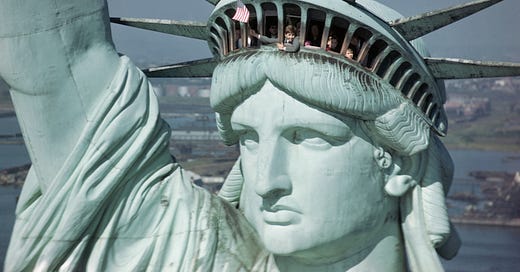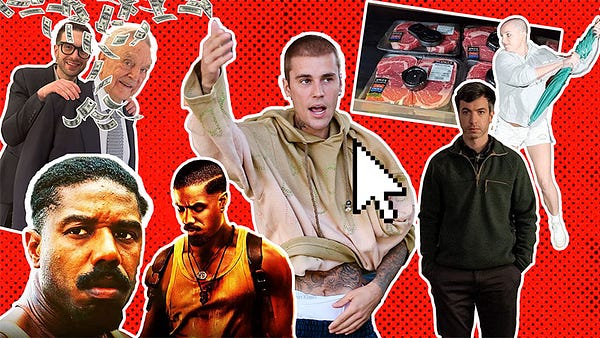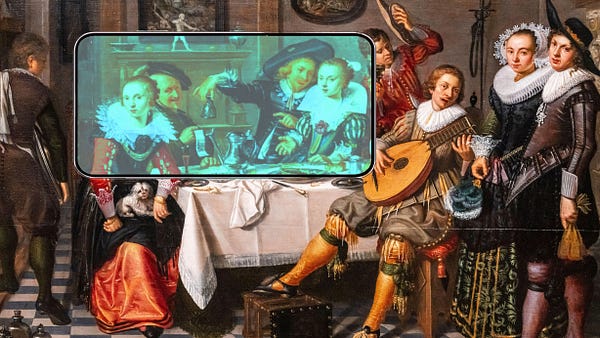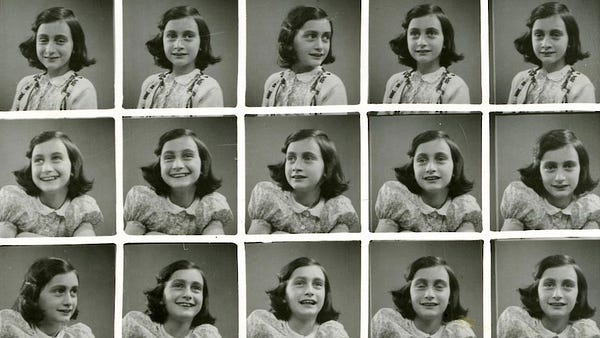
The Free Press

There’s lots of talk of privilege these days, and we are privileged here. I don’t mean white or cishet or able-bodied. I mean privileged by being in this country.
Even with all the intrusions on our freedom that we regularly document here—intrusions from government, from tech, from the hall monitors of elite culture—we still know that we are the freest citizens of any country on Earth.
We are all familiar with the complaints and critiques of America. We lodge many of them ourselves. But there’s always still that fundamental truth: Every single person in this country is lucky. Not by a little—lucky by a lot.
Today, in honor of the 4th of July, we asked Americans we admire to tell us what they love about this country. You’ll notice that many of them are immigrants. We don’t think that’s coincidental: Those who were not born into freedom are alive to what makes this country exceptional.
Happy Independence Day. — BW
The Constitution
By Yeonmi Park
I read the Constitution for the first time when I finally made it from North Korea to South Korea. I was studying English, and collecting letters of recommendation in the hopes that I would win a visa and be able to travel across the ocean to America. Even with my broken English, I teared up reading the sentences. I didn’t know then what the word dignity meant, but that was what I felt for the first time in my life.
My mother and I didn't risk our lives trekking across the Gobi Desert so we could buy a nice car or live in a nice home. We did it to get an I.D. from a government that recognized us as human beings—not as slaves. To us, to become American was like winning a thousand lotteries.
I officially became an American six months ago. It was January in Chicago, the judge was late, we were all in masks, and there were no guests allowed. In my heart, though, I became an American when I first read the Constitution. That day in Chicago, I was given a copy of that document, plus my naturalization certificate, and instructions for registering to vote after I took my oath. Then, I celebrated by going out for steak at the Ralph Lauren Cafe in downtown Chicago with family and a few friends (my mom, who is in South Korea, joined via Facetime.)
It was important to me to eat steak that night because back in North Korea, my mom witnessed the public execution of a man in his twenties who had killed and eaten a cow from a collective farm. He was dying of starvation and he had tuberculosis, but the cow was the government's property, so he was put to death. The regime there gives more rights to cows than to human beings.
Now that I’m an American, I get to eat steak as much as I want. And Kim Jong-un can’t do anything about it.
Yeonmi Park is a North Korean defector and the author of “In Order to Live: A North Korean Girl's Journey to Freedom.”
Pioneers! O Pioneers!
By Liel Leibovitz
Maybe it was the Muppets that made me fall in love with America. I was eight when I saw them on TV, in my native Israel, and I imagined that every American was covered in felt and free of inhibitions and always in a rush to put on a show. Maybe it was the American Patriot missiles I watched from a Tel Aviv rooftop in 1991, intercepting Saddam Hussein’s deadly Scuds and giving me a real life rockets-red-glare display of what fighting for freedom looked like. Maybe it was moving here with a few hundred bucks in my pocket and a college diploma and nothing else and believing—really, truly, profoundly believing—that hard work and good cheer was all it took for me, or for anyone else, to make a life here.
Maybe it was all of the above. And maybe they’re all the same—different facets of the national soulfulness Walt Whitman captured so effortlessly when he sounded that great and ageless American battlecry: Pioneers! O Pioneers!
So what am I most proud of as an immigrant to this land of wonders? Precisely this spirit of hurling ourselves into the impossible.
While some murmur and some despair and far too many rage futilely, American pioneers are building an excellent tomorrow. Some are starting schools to replace the ones corroded by ideological zealotry. Some are launching entire towns built around tried and true American principles of faith, family, and community. All are forging a future our children will be as proud of as we’re proud of the sacrifices and the imagination and the daring that made our American turn possible. So forget the whiners and the shouters, the hysterics and the cynics and those who count the seconds to midnight. Now and forever, it’s morning in America. Thank God.
Liel Leibovitz is editor at large for Tablet Magazine and a host of its weekly culture podcast, Unorthodox, and the daily Talmud podcast Take One.
Upward Mobility
By Roland Fryer
Over the years, I’ve met people from small conservative towns in Eastern India to liberal neighborhoods on the outskirts of Vienna to religious communities in rural Mississippi who have almost nothing in common except the audacity of their dreams, their willingness to sacrifice for them, and America’s role in fulfilling them. In one generation, whether you are an immigrant from Asia or a sharecropper’s grandson, America is a place where you can accomplish whatever you set your mind to.
This stunning trait—the dispensing of opportunity regardless of the hue of your skin or the rhythm of your accent—is what makes me most proud to be an American.
According to my colleague Raj Chetty and his collaborators, the chance that a child is in the top 20% of incomes in America, given their parents were in the bottom 20%, is roughly 10%.
Yes, this differs substantially by race and region of the country. And as a nation, we must do a lot more to ensure that America’s opportunities are more equally distributed across all communities. But I am part of that 10%.
In 2014, I had the pleasure of meeting Barack Obama for the first time. We were in the Roosevelt room in the West Wing of the White House—having lunch beneath the portrait of Theodore Roosevelt on his rearing horse. When the meal ended, he and I shook hands, and the handshake became an embrace.
“Only in America,” I told him, “can a guy like me meet the president.”
“Only in America,” he replied, “can a guy like me become president and meet a guy like you.”
Twenty years prior to that hug, was a wayward teenager who had given up on America. Luckily, America never gave up on me.
Roland Fryer is a professor of economics at Harvard University and a John A. Paulson Fellow at the Manhattan Institute.
Diners
By Joseph Massey
There is nothing like huddling with friends over weak coffee in 24-hour diners. That’s where I spent my teens and twenties, babbling late into the night about art, poetry, politics, and philosophy, free under the bright fluorescent light. Regardless of how packed it often was, the booths felt so private, designed for leaning in, for getting close.
That face-to-face intimacy is lost now. And diners have become novelties—living-history museums complete with tabletop jukeboxes that stopped working decades ago.
But they were once ubiquitous. An American invention (first called “night-lunch wagons” in the late 1800s), diners served graveyard-shift workers and jobless dreamers, the perpetually downtrodden, and broke students for nearly a century. Every town had one, and they dotted the highways in dependable intervals. I remember the Hollywood Diner in Dover, Delaware, the city where I spent my adolescence. (A Google search reveals the Hollywood Diner permanently closed last year after new ownership rebranded it The Southern Grille, a move that failed to revitalize business.) I remember the waitress with the hands that held time in each crease and vein as she gripped the handle of a bottomless coffee pot. Her voice was warm and raspy. She called everyone “dear,” and she meant it.
Joseph Massey is a poet. His latest book is “Rosary Made of Air.”
The Pursuit of Scientific Truth
David M. Sabatini
There is simply no other country in the world that has fostered an explosion in scientific research whose fruits are impacting humanity for the better. We’ve done this by attracting the best talent from all over the world and allowing those people to pursue their curiosity without fear.
In my field of molecular biology, it is de rigueur to point out the many challenges that biomedical researchers face. Some of these criticisms, like the relatively low pay and structural barriers to entry, are well warranted. But I never lose sight of the fact that people like me are paid to make discoveries about nature. I never forget that only a tiny fraction of all the people who have ever existed have had the blessing of being able to earn a livelihood by satisfying their curiosity. I am so lucky to be one of them.
The labs I have been in and have led were microcosms of America: melting pots of hardworking people of diverse backgrounds; rigorous, but zanny; warm, but unpretentious. They were places where every few weeks someone revealed another of mother nature’s secrets—sometimes just a little one but always giving the scientist the thrill of knowing they were the first person to know it. When I worked in the lab I worked crazy hours, sometimes to exhaustion and often to the point where my fingertips would bleed from opening and closing test tubes. I cannot recall a happier time.
David M. Sabatini is a molecular biologist who studies how organisms sense nutrients to control their growth and metabolism.
Self-Determination
By Lulu Cheng Meservey
I was born in a rural village in China. Our family consisted of subsistence farmers who had lived through abject poverty and famine, who had never attained higher education, who had for long stretches survived on one potato a day.
It wasn’t easy to leave the country, but my parents managed it and took me with them. We lived in several different countries and ultimately settled in the U.S., in pursuit of The Good Life.
It worked. I am, like the Big Poppa lyric, living better now.
But what I’ve come to appreciate most about being an American isn’t simply living well in the sense of having cars in the driveway or a well stocked fridge, although those are nice. It’s living the consequences of my own choices.
Where I come from, much of your biography was already written by the time you entered the world. The choices available to you were heavily based on things like your ethnicity, social class, and household registration. The path of your life was determined less by your own decisions and more by a central committee.
In the U.S., being simultaneously female, foreign, and broke didn’t bar me from a good education (and being an ethnic minority and generally lippy individual didn’t flag me for “reeducation”). I’ve been able to decide the course of my career, pursuing the work most meaningful to me—not the work most useful to the government. Here, I can choose to accept the consensus view or to side with the minority. I’ve been able to support political organizing that has criticized both major political parties—and I’ve never wound up in jail. Most importantly, my husband and I were able to marry across geographic, demographic, and political lines. The number of kids we have was decided by us, not by state diktat.
Many people in China, including my family who stayed behind, enjoy a rich and fulfilling life. Maybe I would have too if I’d stayed. But enjoying a life is different from leading a life, and the latter is what I’m able to do in the U.S.
It’s far from perfect, but here, more than where I was born and probably more than anywhere else, we write our own biographies. In deciding to become American, I’m getting to decide much more.
Lulu Cheng Meservey is VP of Communications at Substack.
And if you’re looking for something to listen to while driving to a BBQ or the beach, check out the latest episode of Honestly. It’s an ode to fun and we think you (and your kids) will love it:













"we still know that we are the freest citizens of any country on Earth."
Really? By what measure?
Feels pretty free where I am. Have you lived here as well? Or just read media and travel reports?
Not that I want a Freedom Swinging contest.
Seriously though, who would know who is freest?
Maybe "amongst the freest"?
The problem with leading with such a definitive and unsubstantiated statement, is that it invites doubt into my mind about the credibility of what is to follow.
But maybe that's a good thing.
Marvelous! Consider making it an annual tradition!